
Kwaidan
The Black Hair
 |
The narrator starts by saying that there was once a samurai who had fallen into poverty due to the death of his lord, so he decided to take a job somewhere else.
He leaves his wife behind. He is concerned about his “advancement,” and that he can't overlook that for her sake.
She tries to get him to stay but he leaves her anyhow.
The guy gets remarried.
Apparently his new wife is used to being waited upon. He was the one who got the water for her to use.
He took her with him to his new position.
He thinks about his first wife.
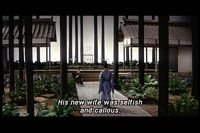 |
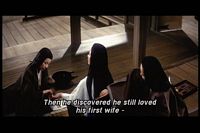 |
He thinks about his ex-wife all the time, even when he's on a horse in a tournament of some kind shooting arrows at small targets while he's riding.
She slaps him with her fan twice when he (while still sleeping) pushes her away.
He decides to find his ex-wife and make amends. It was years later before he looked for her, though.
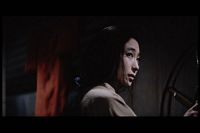 |
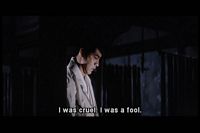 |
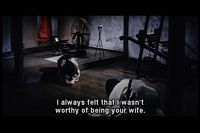 |
He apologizes and she says she wasn't worthy of him.
He kisses her.
He wakes up in the morning and finds out that his wife has actually been dead for a long time.
He flees from her and hears a lot of strange noises.
The ending doesn't make a whole lot of sense. The story was quite predictable. There is almost no music at all during the episode and what noises there are tend to be more annoying than scary.
The Woman of the Snow
A written version of this legend can be found in the book Kwaidan. The story is called “Yuki-Onna”.
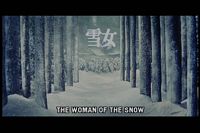 |
Two men, one old and one young, are woodgatherers.
The sky has all sorts of strange designs in it.
The two men take refuge in a ferryman's cottage.
A woman bends over the old man and blows an icy breath on him.
She starts talking to the young man.
She warns him not to tell anyone what he's see her do.
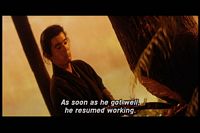 |
One day he meets a woman in the forest. She says she is going to Edo. He invites her to stay the night at his place with he and his mother.
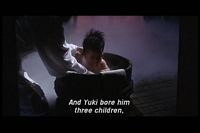 |
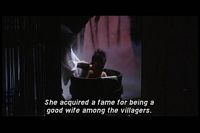 |
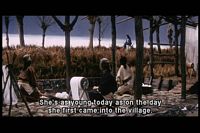 |
While he watches her sewing he suddenly sees her real image.
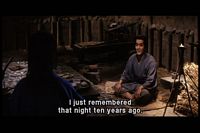 |
He tells her the story of that night (even though he had been told never to mention what had happened.)
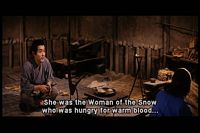 |
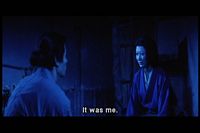 |
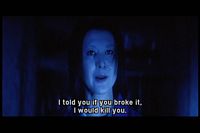 |
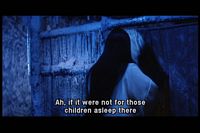 |
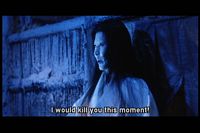 |
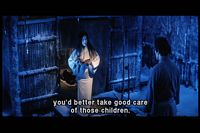 |
Then she leaves.
Hoichi, the Earless
A written version of the legend can be found in the book Kwaidan, by Lafcadio Hearn. He entitles the story “The Story of Mimi-Nashi-Hoichi.” Hoichi was a blind player of the instrument called the biwa, and he had a remarkable memory for songs.
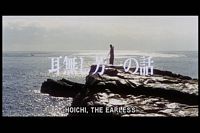 |
Hoichi listens to the sounds of the sea and the waves.
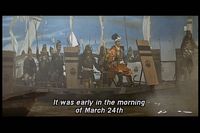 |
 |
The section then goes into a story about two clans. The one group lost the battle and the last few of them committed suicide by drowning.
The area has been haunted for hundreds of years.
Hoichi is an acolyte at a Buddhist temple.
Hoichi is now alone, late at night, and he starts hearing strange sounds.
Someone calls his name.
Samurai were still very powerful at the time of the story, so Hoichi basically had to go with him.
The next morning the people realize that Hoichi is not there. Then later they decide he's asleep in his room.
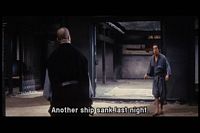 |
They're talking about a ghost ship.
The next night the ghostly samurai turns up again.
The next morning two of the guys in the temple see Hoichi returning and he's obviously not in really good shape.
The priest wants to find out what is going on with Hoichi.
There's a really bad storm going on, but Hoichi goes out yet again. The priest tells the guy and his friend to follow Hoichi.
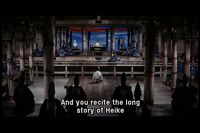 |
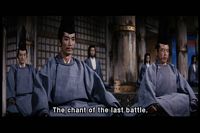 |
Hoichi continues to tell the story while the two guys have traced him to the cemetery.
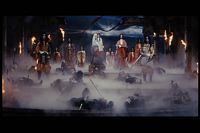 |
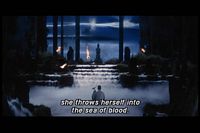 |
The two guys find him still chanting.
The priest explains to Hoichi what is going on.
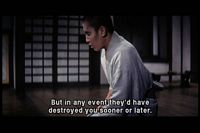 |
The priest paints special symbols on Hoichi.
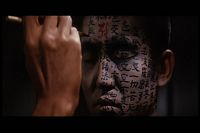 |
The priest explains to him what to do. (Here is a problem. Although the one guy says he wrote the symbols all over Hoichi's body, it's painfully obvious that his ears do not have any symbols on them. Thus, it becomes almost absurd that the priest asks this question with Hoichi and his unpainted ears sitting only a couple of feet away. In the written version of the story, there is no similar scene.)
Hoichi waits.
To the ghost, Hoichi is invisible, mostly.
But his ears are visible.
The samurai has ripped Hoichi's ears off.
Again, this is why altering the actual story doesn't work. They two men are talking about how could they have possibly missed writing the holy text on Hoichi's ears, when he had earlier been within two feet of both of them who could have easily seen his ears had no writing. It would have been better if they had stuck to the original story, where the priest's helper had done all the writing and the priest had not checked out Hoichi first, leaving it that the helper had plainly forgotten to do the ears.
A bunch of people of nobility have arrived to hear Hoichi the Earless play.
He agrees to play the biwa.
In a Cup of Tea
 |
The episode starts with two girls playing what appears to be a version of badminton, except they have to hit the piece up at least once before hitting it back at their opponent.
The narrator says there are very fragments of fiction in old Japanese books, the fiction pieces never finished for one reason or another.
A samurai looks in a bowl of tea and sees a reflection of some other person. He gets rid of the tea, gets different bowls and new tea, but each time he sees the reflection.
The guy who saw the reflection is on duty at night when someone appears. It's the same guy he saw in the reflection. They start to fight but the guy disappears.
He calls everyone out but is told that no one can find a trace of the intruder, or any blood where the guy had supposedly wounded him.
Late the next night. The samurai and his sister are talking when a guy comes to the room and says there are three visitors.
The guy is going to come back to get even, apparently. The samurai moves to attack the three guys but they all disappear.
The guys keep appearing and disappearing and he keeps trying to fight them. It seems he's starting to go nuts with the effort.
The maid and the publisher see the guy's reflection in the water.
Main index page
Japanese Dramas Main Index Page
|
|